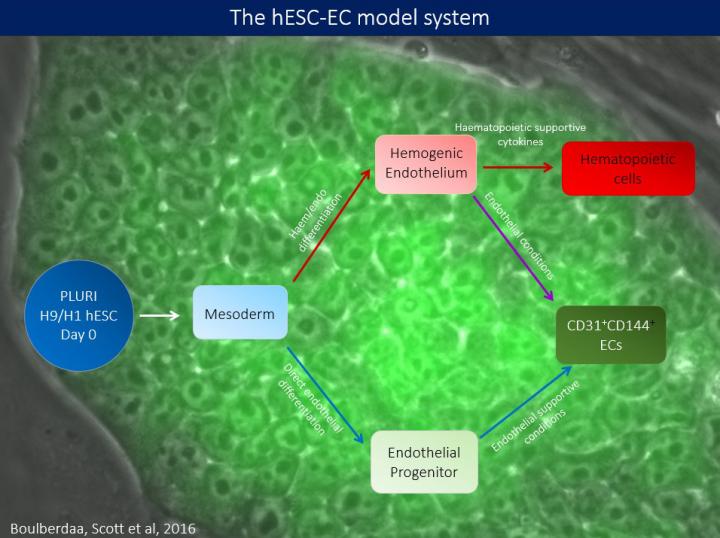Assessing the maturation, specification and function of vascular endothelial cells derived from human embryonic stem cells
We have developed a method to generate large numbers of vascular endothelial cells from human ES cells. We use this to achieve two aims: (1) to understand the molecular and cellular processes that drive endothelial maturation and specification and (2) to assess the therapeutic potential of derived cells for therapy of ischemic conditions.
Blood vessels are lined by vascular endothelial cells, thereby providing an interface between blood flow and the vessel wall. In conditions where blood flow is poor (tissue ischemia; for example after a heart attack), promoting blood vessel formation is a major goal to improve patient outcome. Our derived endothelial cells are showing great potential is this setting and are being developed now towards a first-in-man clinical trial.
Research Methods and Objectives
We use different hES cells to produce vascular endothelial cells, using a method that is directed and not based on embryoid bodies. The cells that result from this procedure show high levels of both CD31 and CD144 on their cell surface. They also loss of pluripotency, a very important determinant of safety of the cells should they be developed for clinical use. We have used these cells to:
-
Assess their function in vitro, assessing angiogenic potential
- Assess their function in vivo in the context of ischemic conditions, in the presence and absence of concomitant diabetes.
- Assess the longevity of biodistribution using imaging techniques.
Our recent publication demonstrates the above is consistent with a cell therapy product that provides potential efficacy in tissue ischemia.
Additionally, we are interested in using the differentiation system to understand the processes that lead to specification of defined endothelial types, including arterial and venous. We are using single cell approaches to address this. Our goal is to understand the contribution of non-coding RNA to those processes.
- Recent Publication-Robust Revascularization in Models of Limb Ischemia Using a Clinically Translatable Human Stem Cell-Derived Endothelial Cell Product
- Single Cell Approaches

Principal Investigator, Co-Investigators, Other researchers
Andy Baker, Patrick Hadoke, David Newby, Adriana Tavares, Costanza Emanueli, Bijan Modarai, Jo Mountford, Neil Henderson

